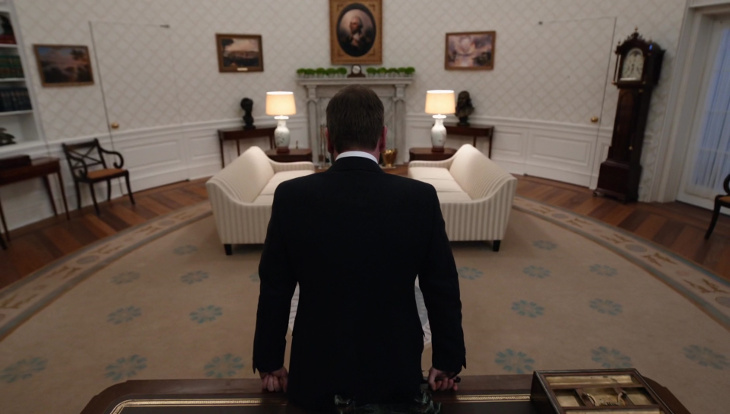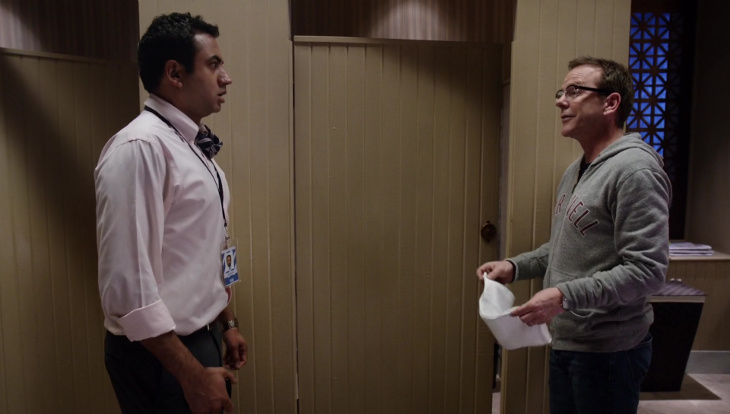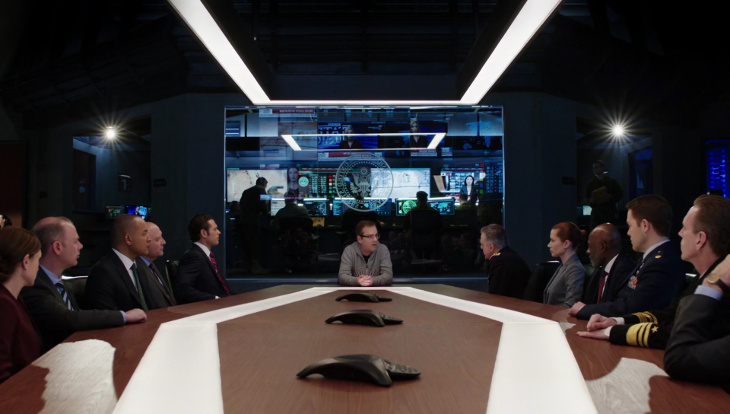
“Mister Ambassador, you may not know much about me, but what you should know is that I’m about as straight a shooter as you’re going to find in Washington, so you should believe me when I tell you that I do not want, as my first act as Commander-in-Chief, to attack Iran.”
Designated Survivor is ABC’s new political thriller starring Kiefer Sutherland as Thomas Kirkland, a low-level cabinet member who finds himself thrust into the role of president when the entirety of the executive and legislative branches are taken out by a terrorist attack. Comparisons to 24 are inevitable, but, aside from the focus on the aftermath of a terrorist attack, the similarities are limited. Kirkland is, by nature, a far less aggressive character than Jack Bauer, and his involvement in the aftermath of the attack is completely different. There are some issues with execution, but it’s largely successful in making Kirkland likable and there are no apparent weak links among the cast, even if some characters come off too strongly for the show’s own good. Ultimately, Designated Survivor isn’t necessarily an exceptional piece of television, but it is polished, and it does have an interesting central idea. Whether or not this will be enough for it to find an audience remains to be seen.

The primary focus of this episode is on the Thomas Kirkland character. There were occasional cutaways to other characters including Maggie Q as an FBI agent or Kirkland’s son, but I question whether it may have worked better to center the focus solely around Sutherland for this episode. It may have better captured Kirkland’s sense of dismay and the gravity that comes with being abruptly placed in such an important position. The episode still captures some of those elements, but, despite there being a massive explosion at the capitol building during the state of the union, the emotions feel somewhat diluted. Maggie Q has a few seconds of grief at points, as it appears she has lost someone in the attack, but it is fleeting. The writing is largely decent. There are a few great lines, but there are also a few groan worthy ones. During a flashback to the events from earlier that day, Kirkland delivers a few too many “This is really not how I saw today going,” lines that really don’t work, particularly since the editing has already given us a glimpse of the events at the capitol.
There are some other elements that feel a bit contrived. Once it is clear Kirkland is the last one in the line of succession, the secret service attempts to secure him and his family, but it turns out that his son isn’t where he said he’d be. Instead, he’s at a rave dealing drugs, because if this show learned a single thing from 24 it’s that ridiculous levels of family drama are bound to pop up on the day that everything else falls apart. Tanner Buchanan does a fine job as the son, but it is still a plot point that doesn’t really work. Kirkland is also having to deal with a U.S. Army General who is so eager to go to war that he feels a bit like he was borrowed from the set of Dr. Strangelove. The episode is hinting that he may strive to undermine or overthrow the presidency. These are odd issues to be bringing up in the pilot, because, believe it or not, but there is already a lot of drama built into the idea that all the nation’s leaders are dead, and the only one available to take their place is an inexperienced and unelected official.

The key strength of this episode remains Kiefer Sutherland’s performance. He carefully straddles a few different lines with the character. He’s cautious but not weak and overwhelmed but not helpless. The surrounding characters are struggling to show him the respect that the position requires, and he in turn is struggling to grasp the specifics of a role he never intended to be filling. Natascha McElhone portrays his wife. She largely serves as an emotional support for the character, though there are moments where she is forced to grasp the weight of the situation, like when Kal Penn’s character points out that as she is the first lady, he is to address her as “ma’am.” It’s small moments like those that stand out.
Before I wrap up, a few Notes and Nitpicks:
- Natascha McElhone and Kevin McNally pull off good American accents. I barely thought to question them until I was looking back at the cast for the show. I am a little bemused at how the President is a British-born Canadian.
- I’m deliberately avoiding all comparisons and references to the current electoral season. The first episode of the show is deliberately non-partisan to the point that I don’t think they state anyone’s political affiliation. I’m pretty much positive that the late-President is a Democrat, due to a line by reporters suggesting that Congress won’t permit him to move forward with his plans. I’m not making that conclusion based on partisan views mind you; in modern times the Democrats have displayed less party unity that the Republicans, and thus have been far less effective at obstructing legislation. Therefore, the conclusion that the President was a Democrat seems a reasonable assumption. That may not be true of Kirkland’s character, but historically the odds suggest he probably is as well.
- Kal Penn is the type of actor where, even now, it is odd to see in serious roles. He’s good in this, but the initial response upon seeing him in something like this always seems to be one of surprise.
- Malik Yoba plays the Deputy Director of the FBI. It’s nice to see an Alphas-alumni in something other than Kevin Can Wait, this season.




Add comment